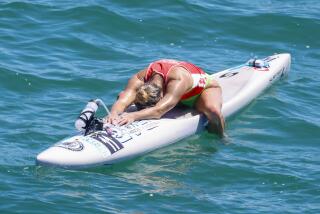Cyclist Chris Horner still has no memory of Tour de France crash
- Share via
Chris Horner had perhaps his most successful year as a cyclist in 2011. He won the Amgen Tour of California, finished second in the Vuelta al Pais Vasco, a celebrated one-day race, and finished fourth at the Volta Ciclista a Catalunya.
Yet what most cycling fans remember about Horner’s 2011 racing is something Horner doesn’t.
During the seventh stage of the Tour de France last July, Horner crashed. He suffered a concussion, broken nose and broken ribs. But despite being woozy and dazed, Horner got back on his bike and finished, though he had no idea where he was or even quite what he was doing.
A year later and ready to defend his Amgen title in the race that begins Sunday in Santa Rosa, Horner, a native of Bend, Ore., who is 40 years old and living in San Diego now, said he still doesn’t remember any of that crash.
“I’ve watched it on video and what makes me realize how out of it I was, is how I kept asking this same rider every two minutes the same question. ‘How far from the finish?’ We were about 250 meters from the finish and I kept asking. It’s like the kid in the car asking ‘Are we there yet?’ over and over. I just had no idea.”
Horner, who rides for the RadioShack-Nissan-Trek team, said he blames no one for not making him stay off the bike when he was clearly in distress, just as, he said, you can’t expect NFL players, or any athletes, to be forced to quit their sport because of concussion damage.
As a San Diego resident, Horner said he has paid close attention to the discussions that have taken place since popular former Charger and USC football star Junior Seau committed suicide.
“I find it insulting what some of the players have done, bringing lawsuits,” Horner said. “I don’t have a college education but if you’re hitting your head every day, there’s going to be some damage. There’s not a single athlete, including cyclists, who isn’t willing to take risks. You could walk up to just about any athlete and say, ‘You can play your sport two more years and have a head injury or quit now without one,’ and just about all of them would say, ‘I’ll play two more years.’”
Horner said he can’t pinpoint exactly why he doesn’t feel as perfectly in shape as he did coming into the California event a year ago but he points to Saturday’s stage, which finishes at Mt. Baldy, as the key for him for most of the favorites.
“The time trial [in Bakersfield on Thursday] is mostly damage control,” he said. “The Big Bear stage Friday is a tactical nightmare, so unless you can somehow get out and come to the finish line solo, it’s not a stage that will benefit me or any who’s a favorite.”
Horner lists young American Tejay van Garderen of BMC Racing, a third-year pro who says winning this race is a major goal this season; Dave Zabriskie, a six-time U.S. time-trial champion from the Garmin-Barracuda team; Tom Danielson, also of Garmin-Barracuda who finished third last year; and Italy’s Vincenzo Nibali of the Liquigas-Cannondale team and winner of the 2010 Vuelta a Espana, one of the world’s three big grand tours, as his favorites.
Three-time Amgen champion Levi Leipheimer of the Omega Pharma-Quick-Step team said Friday he will start the race in his home town of Santa Rosa though he is still recovering from a broken fibula suffered in a practice ride in Spain earlier this year.
Kristin Bachochin, executive director and senior vice president of AEG sports, which presents the race, called this year’s course “the most challenging” in the event’s seven-year history and noted that results here for riders such as Horner and Van Garderen could be important in the naming of a U.S. Olympic team later in the summer.
twitter.com/mepucin
More to Read
Go beyond the scoreboard
Get the latest on L.A.'s teams in the daily Sports Report newsletter.
You may occasionally receive promotional content from the Los Angeles Times.









